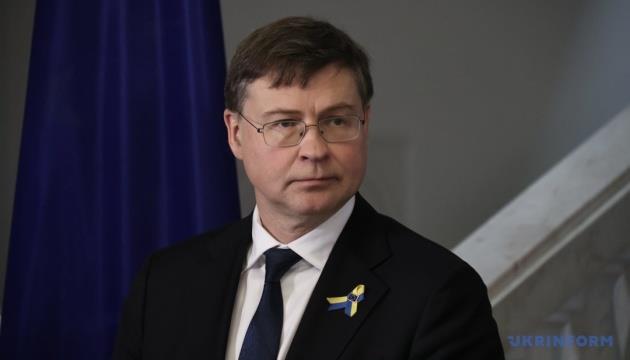
Reparations Loan Can Help Avoid Burdening EU State Budgets - European Commissioner
Dombrovskis said that at today's meeting, the finance ministers of the member states expressed "broad support from member states of the commission to continue its work on the reparation loan" and recognized the urgency of the matter, as well as the commitment to ensure support for Ukraine to overcome its financing gap in 2026–2027.
"There was wide recognition that this option is the most feasible means of quickly bridging Ukraine's gap without placing additional substantial fiscal burden on member states," he noted, adding that the work involves engagement with member states to resolve outstanding issues.
He noted that the parties also discussed possible alternative options.
"It has to be noted that given that sustainability concerns and challenges Ukraine is facing, the support has to have strong grant-like features. So alternative option would be for the EU to fund the reparation loan to Ukraine through borrowing instead of using cash balances associated with immobilized Russian assets. However, member states would have to cover the interest costs of the loan until it's repaid, to maintain grant-like support for Ukraine," he explained.
He added that there are different variations of how such borrowing could be structured.
Another option would be to provide Ukraine with an equivalent level of support in the form of grants, which would result in significant direct costs for member states over a short period.
Dombrovskis added that an official paper outlining the financing options will be presented soon.
"It is important in parallel to engage with our allies and like-minded partners to provide Ukraine with liquidity already in the first quarter of next year, as Ukraine's financing needs are not only large but also urgent. We are under time pressure and must move forward in a constructive, pragmative and cooperative way," Dombrovskis stressed.
Read also: Ukraine may receive EUR 6B tranche from EU tomorrow – PidlasaFor her part, Lose summarized that the European Commission's proposal for a reparations loan remains the best and most realistic option and should stay a priority, while the Danish presidency of the EU Council will continue working with member states to reach a decision.
As Ukrinform reported, EU finance ministers met today in Brussels to discuss ways to provide Ukraine with financial support of EUR 130–140 billion ($152–163 billion) - either through borrowing or, more likely, through the use of frozen Russian assets.
Legal Disclaimer:
MENAFN provides the
information “as is” without warranty of any kind. We do not accept
any responsibility or liability for the accuracy, content, images,
videos, licenses, completeness, legality, or reliability of the information
contained in this article. If you have any complaints or copyright
issues related to this article, kindly contact the provider above.

















Comments
No comment